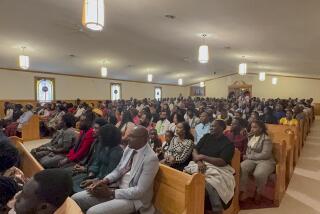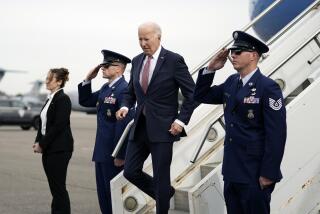Racial Unrest Deep Within Calm Alabama Town : Race relations: Black and white ministers are trying to draw community together. But tension, fear linger.
FORT DEPOSIT, Ala. — A measure of calm has returned to this city after the slaying of a black election worker and a suspicious fire at the home of the white mayor. But black and white ministers wonder how long the peace will hold.
“I think it’s a balloon about to pop,” said the Rev. Howard Jones, a black preacher who helped form a group of black and white ministers to try to ease racial tensions in this community 30 miles southwest of Montgomery.
Like other small towns in the Deep South, Fort Deposit has racial divisions deep and rigid. Although 70% of the 1,500 residents are black, the mayor and most of the City Council are white. Few whites attend the public schools.
“We’ve been sending warnings to Montgomery for years about how we’re treated down here, but nobody would listen,” said Jack Jones, the black owner of a used-car lot. “Now somebody’s dead, and everybody wants to listen.”
Tensions flared in Fort Deposit the night of Sept. 2, when someone set fire to the home of retiring Mayor Ralph (Bunk) Norman.
Police, watching the house after a tip, fired two shotgun blasts at a group of men seen running from the fire. The next morning, Raymond Davison was found dead of a shotgun wound to the head at the bottom of an embankment nearby.
A crowd of blacks gathered, angrily accusing police of killing the 33-year-old Davison. State troopers were called in to guard against violence among the 700 people at his funeral.
Patricia Means, Davison’s aunt, accused whites of conspiring to “kill somebody black to prove a point.”
A week before Davison’s slaying, several white-owned businesses were vandalized after a mayoral election in which a white candidate, Paul Craig, defeated Elbert Means, an outspoken black man. Davison, who helped supervise the Aug. 25 election, was a nephew of Means.
The shooting is under investigation, and authorities said it isn’t yet known if the shotgun pellet that killed Davison came from the gun fired by officer Rufus Mitchell. Mitchell has been suspended. No arrests have been made in the fire.
Some white residents were reluctant to discuss the situation.
“We’re scared to death,” a middle-aged white businessman said. “We’re afraid if they see our names in print, we may be next on their list.”
The ministers group is trying to quash rumors about the case and bridge racial divisions.
“When you’re divided in church and divided in the school system, then you’re divided in public. That’s the danger,” Jones said. “People don’t ever talk to one another. That’s a danger, too.”
The Rev. Gene Murphree of the United Methodist Church, who is white, said he had never met with the black ministers before the shooting.
“Just the fact that we’re meeting means that there’s one good thing coming out of it,” said the Rev. Tom Tew, the white minister of the Bethel Baptist Church.
On Tuesday, four white-owned businesses announced a partnership with the elementary school, which is predominantly black. The businesses will provide supplies, refurbish a playground and help with a reading program.
Organizers said the partnership was in the planning months before Davison’s slaying and that the two are not linked.
Murphree, whose wooden church dominates a block near the town’s center, said more needs to be done.
“I think there’s going to have to be some sitting down by the leaders of the community and government to discuss where do we go from here,” he said.
More to Read
Sign up for Essential California
The most important California stories and recommendations in your inbox every morning.
You may occasionally receive promotional content from the Los Angeles Times.










